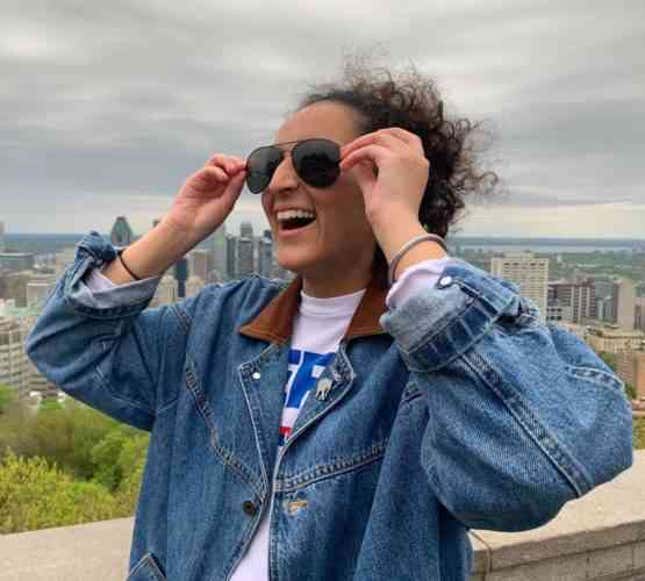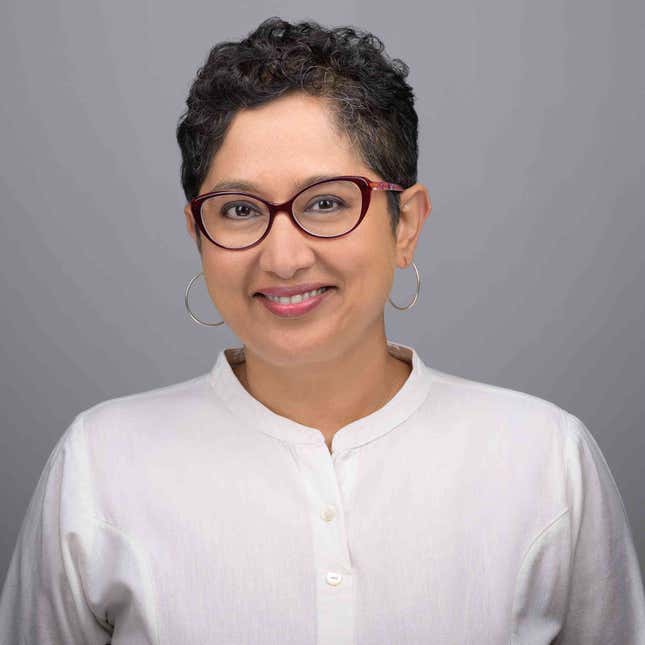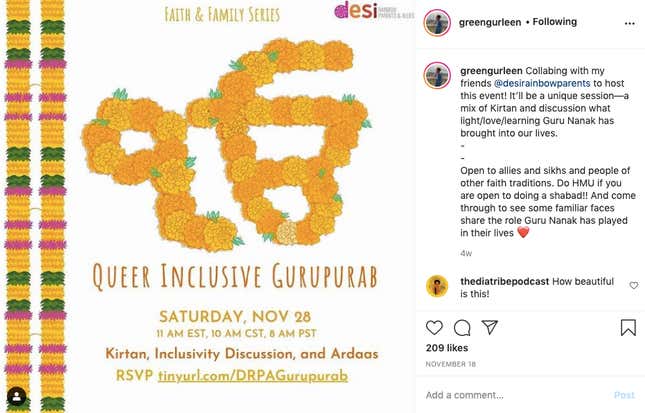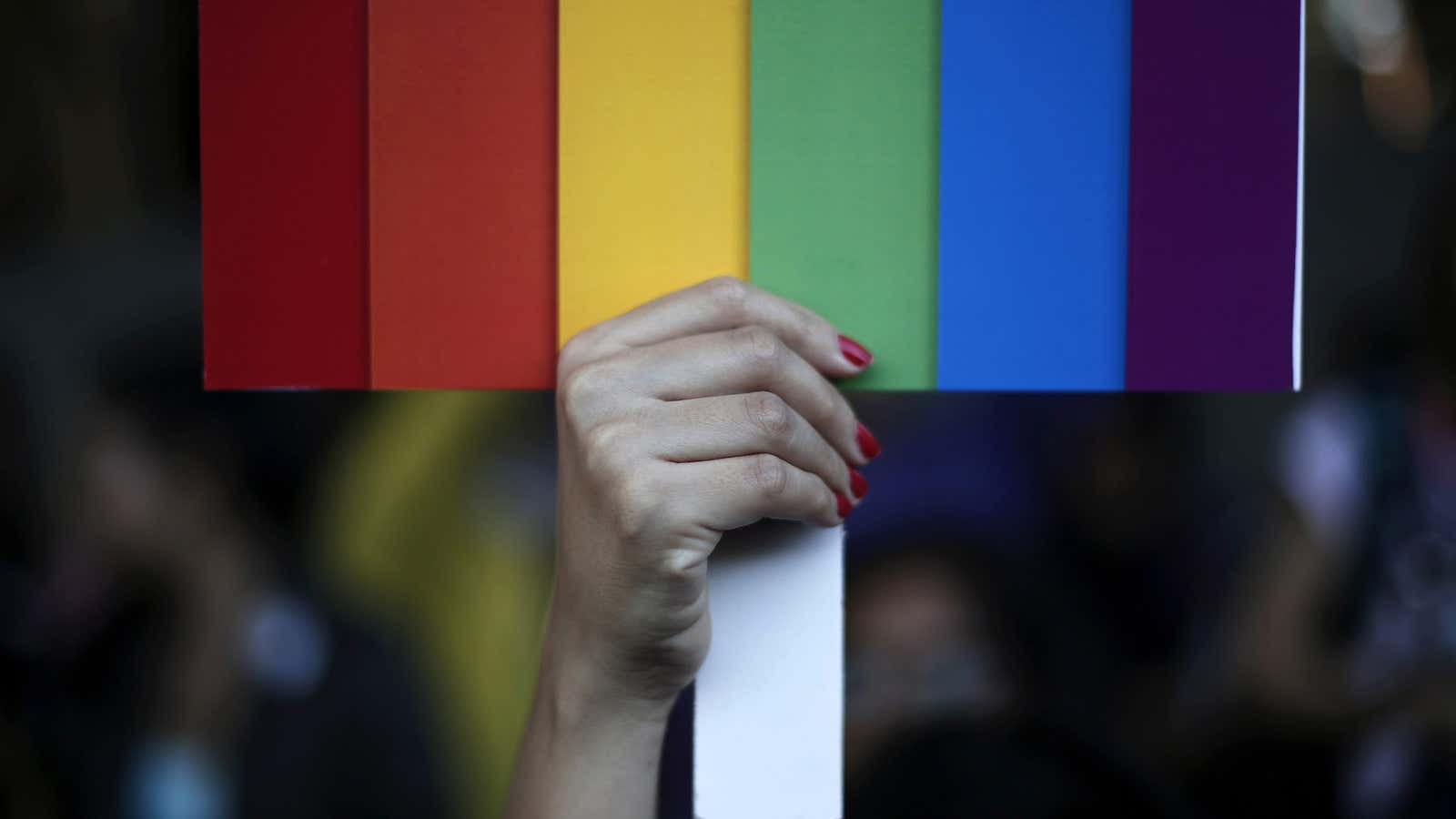When Gurleen Kaur came out as queer to her friends three years ago, she was all too familiar with her family’s expectations—that she marry a man someday. That was still a possibility for the 27-year-old, which would likely then lead to the full-package large celebration with all her friends and family present. But Kaur also knew she would likely not get any of that fanfare if she married a woman.
Dressed in a black tank top and with her long, curly hair partly tied in a bun, Kaur said she was aware of an entirely different future just steps away if she ended up with a man. “This just led to chaos in my brain,” she said. “It messed me up for a little bit.”
Kaur, a second-generation immigrant whose family moved to California from Chandigarh in the 1980s, came out to her mother later that year, who then told Kaur’s father and grandparents. While one of her grandmothers is yet to acknowledge her queer identity, the other regularly lists all of the reasons why she should marry a man.
“It’s objectively hard to hear all this. I feel like there’s a doomsday around the corner,” she said, referring to her future wedding day. But the struggle doesn’t end there.
“There’s just hurdle after hurdle,” she added. “I also want children one day, and I’m perfectly comfortable with the idea of going to a sperm donor.” All of this is extremely non-traditional for her Sikh family, making the acceptance of her choices difficult.
Kaur, who now lives in Boston, however, considers herself fortunate to have gained some form of acceptance. “I wasn’t disowned. In fact, my family obsessively wants me around them,” she said, adding that she was conscious of her privilege because many in the South Asian diaspora community who identify as LGBTQ+ aren’t as fortunate.

Toronto-based Sonali Patel, who goes by Alyy, is still waiting for their queer identity to be accepted by their family. Beyond the pressure to get married in the traditional way, the 24-year-old also has had to deal with remarks that being gay is abnormal and shameful as well as emotional blackmail and even violence. Patel labels the experience of navigating their sexual identity in a South Asian family as a version of “queer survival.”
“Existing as a queer person in South Asian families is very draining,” Patel said, adding that their mother is “aggressively ignorant” to their queerness, while their father remains largely unaware. “It’s extremely lonely being rejected by my own family.”
Shame and stigma
According to New Jersey-based Aruna Rao, whose child identifies as transgender, the Indian-American community largely considers being LGBTQ+ a matter of shame. “If your kid is queer or trans, it’s seen as a matter of grief for you,” she said.
When her child first came out to Rao as queer in 2015, she wanted to support them in whatever way was necessary. But as a parent, Rao first wanted to educate herself and recalled struggling to find support for families like hers.
“While there are a lot of resources for families in America to help support their LGBTQ+ child, when I went to those spaces, I felt invisible and uncomfortable,” she said. “I didn’t feel like I was a part of that community.”
There are very few resources or organisations to specifically help diaspora families and parents overcome the stigma and internalised homophobia and transphobia prevalent in South Asian culture. This lack of support often makes them feel highly isolated. “We often feel like we’re the only people in the world with a queer child and worry about what our community will say and how our children will be treated in community spaces,” Rao added.
So while many in the desi queer community are scared of losing their families if they come out, their parents and families are afraid to lose their larger community.
“The fear of ‘log kya kahenge?’ (what will people say?) forces them to remain in the closet as being the family member of someone who is queer or trans for the rest of their lives,” explained 43-year-old Kingston Kodan, whose family immigrated from India to the US when he was 10.
Washington DC-based Kodan does not have a traditional Indian or Indian-American narrative. His Tamil-Christian family doesn’t either. Being a part of the minority Christian community, they felt like outsiders even while they lived in India. When his mother divorced her husband to escape an unhappy marriage and moved to the US in the 1980s, it was almost unheard of for a Tamil woman to act in this way.
Seeing his family deviate from conformity on several occasions and proudly embrace their non-traditional narrative gave Kodan the confidence to come out to them as queer when he was 26. “I thought everything was going to be okay,” he said.
It did not go as expected.
He described the experience as funny and tragic. “I came out to my brother first, and he didn’t take it well,” Kodan, with his slightly greying hair neatly combed back and a salt-and-pepper stubble covering his face, said that this reaction confused him. When he came out to his mother next, her first question was: “Are you like Ellen Degeneres?” This was followed by shock and months of crying.
‘Frozen in time’
Despite modern Western culture and laws being more accepting of the LGBTQ+ community as compared to South Asian countries, Rao said the diaspora families living there carry a lot of shame. Sometimes even more than the ones in India, Pakistan, or Bangladesh.
“South Asian immigrant communities tend to get stuck in the phase that we immigrated in. We carry with us our beliefs and knowledge about everything—including LGBTQ+ identities,” Rao explained.
Living in New Jersey, Rao is surrounded by Indian immigrants. But she said that when she talks to people around her about gender being fluid, she feels as if she is living in Ahmedabad of the 1980s.
“People are very parochial in their thinking and hold antiquated ideas about sexual orientation and gender identity. They have not moved on the same way that actual Ahmedabad has—where there is a pride parade now,” Rao said while seated on a red couch in her living room, the very space where she founded an organisation called Desi Rainbow Parents & Allies in 2017 to help overcome these challenges.

Rao gathered together five New Jersey Indian-American families whose children identified as LGBTQ+ to talk about their lived experiences and struggles, and offer support to one another. For many, it was the first time they could freely and proudly acknowledge their child’s sexual or gender identity. “It was very moving. There was this feeling of being seen and heard,” she said.
For Rao, there was no looking back.
Since then, Desi Rainbow, which aims to help diaspora families reach a place where they can support their queer or trans children, and to give those in the LGBTQ+ community the needed support even before their parents can do so, has grown both in number of members, volunteers, and the different ways they offer support.
“These are people among the diaspora community who have all their lives craved family acceptance,” said Rao. “That is what we’re trying to provide here. Our big goal is to create a space where they can be seen, accepted, and affirmed.”
When a parent or family member approaches Desi Rainbow, a volunteer or group of volunteers begin by giving them a space to unload their fears and grief and show them that many within the organisation have gone through similar journeys. “We’ve been able to process these emotions and complicated feelings and reached a place of accepting our child’s sexual orientation or gender identity,” Rao explained.
The organisation runs regular virtual support groups for Indian-Americans who identify as LGBTQ+ as well as families and allies. There’s also an informal peer-to-peer network, where a family is connected to another one in their area, one they would be able to relate to and get support from.
Building community
During their years of failing to get family acceptance, and being virtually trapped in a “toxic and emotionally abusive situation,” Patel said they were made to feel like a disappointment to everybody and were unworthy of being loved. “I constantly had a limited will to live.”
They coped in some unhealthy ways, like “binge working” and pulling all nighters for days—reassociating their worth with their work. Patel’s family stressors were amplified by the rejection and racism that they experienced in queer spaces. “There was an unspoken guideline that to be accepted in these spaces, you must be white,” they said. “I shouldn’t have to be forced to give up my desi identity in order to feel accepted by this queer family.”
This exclusion from both the South Asian as well as the LGBTQ+ communities was a lonely experience, Patel said. The othering as well as the will to not give up either of their identities—desi and gay—led them to take up activism and launch the Queer South Asian Womxn’s Network with the aim to enhance visibility and a sense of belonging amongst gender-marginalised LGBTQ+ South Asians.
“My passion and love for the desi queer community is why I organise,” Patel said.

While the support of allies is crucial, Kaur said it’s not the same as walking into a space where nearly everyone’s desi parents have read the same scripts to them when they’ve come out. They have the same fear pre coming out.
“It’s like feeling seen and understood in a way that only people who identify in the same way can provide for you,” she said. “I felt like I had inhaled a cool breath of fresh air and hadn’t realised that till then I had been breathing at 75% capacity.”
With an aim to build a community that supports one another, Kaur began hosting virtual queer Sikh meet-ups to allow a space for LGBTQ+ Sikhs to talk about their journeys and even collaborated with Desi Rainbow recently for their ‘Queer Inclusive Gurupurab’ event—a part of the organisation’s Faith and Family program.
“The idea is to create a space for LGBTQ+ South Asians where people of the older generation—uncles, aunts, parents, and grandparents—who completely accept you, where desi queer folks can celebrate festivals with their community and not be closeted,” Rao explained. “You can be yourself, you can come as you are, dress how you want, and express your sexual orientation and gender identity however you want.”
The Nov. 28 event was attended by over 40 people and gave the participants a chance to talk about what Gurpurab means to them. “A lot of tears were shed and people were emotional because for many years, a lot of people had felt left out by their own community, religion, or families,” said Anupam Dev Goyal, the communications coordinator at Desi Rainbow. “Here they felt included, and were able to connect to their roots.”
Kodan, co-president at Desi Rainbow, participated in a similar “Christian Faith and Family” event earlier this year, and described it as a “deeply emotional” experience. “I was blown away because I had never seen so many Christian South Asian desis in one place,” he said. “For the first time in my life, I was in a space where all my identities—Tamil, Christian, gay—were centered and accepted.”
Anxiety and acceptance
Despite the support of an Indian-American queer community, the lack of family acceptance can be an isolating experience for LGBTQ+ South Asians, leading to problems like anxiety and depression.
Being an immigrant population, young South Asians often feel the pressure of conformity. Knowing the sacrifices that their families made by moving to a foreign country to ensure a better life for them, children of immigrants carry the burden of not doing anything to disappoint their parents—making it harder for queer South Asians to come out.
“This can make LGBTQ+ South Asian immigrants feel like they are carrying a unique burden,” Sree Sinha, the co-founder of the South Asian Sexual & Mental Health Alliance, said.
Founded in 2015, SASMHA focuses on sexual health, mental health, and LGBTQ+ issues by doing workshops, listing essential resources, and providing a platform for those in need to connect.
“In that context, how your family reacts can be crucial,” 27-year-old Sinha, who identifies as queer, said. “There can quite literally be a sense of life and death in terms of someone feeling accepted and knowing that they are still loved and cared for regardless of what their sexual orientation is and regardless of what their gender identity is.”
With organisations like SASMHA, QSAW and Desi Rainbow offering online resources, virtual meetups and a social media community, for those failing to find acceptance from their immediate family, the internet can be a blessing—offering a space to feel seen and accepted as well as a platform to talk through specific issues.
“There’s been a lot of information available and some more amount of normalising of the queer and trans experiences over the last decade or so,” said Colorado-based Sinha, a second-generation Indian immigrant who came out to her parents at 13. “That does help for people to increase at least their latent amount of knowledge.”
Sinha said she has experienced this change among her own community. “
Maybe one day we can get to the point where it can feel very equitable,” she said. “Maybe we can reach a point where it doesn’t have to feel like a different thing at all to be queer or to be a woman partnered with another woman.”
This article first appeared on Scroll.in. We welcome your comments at [email protected].
